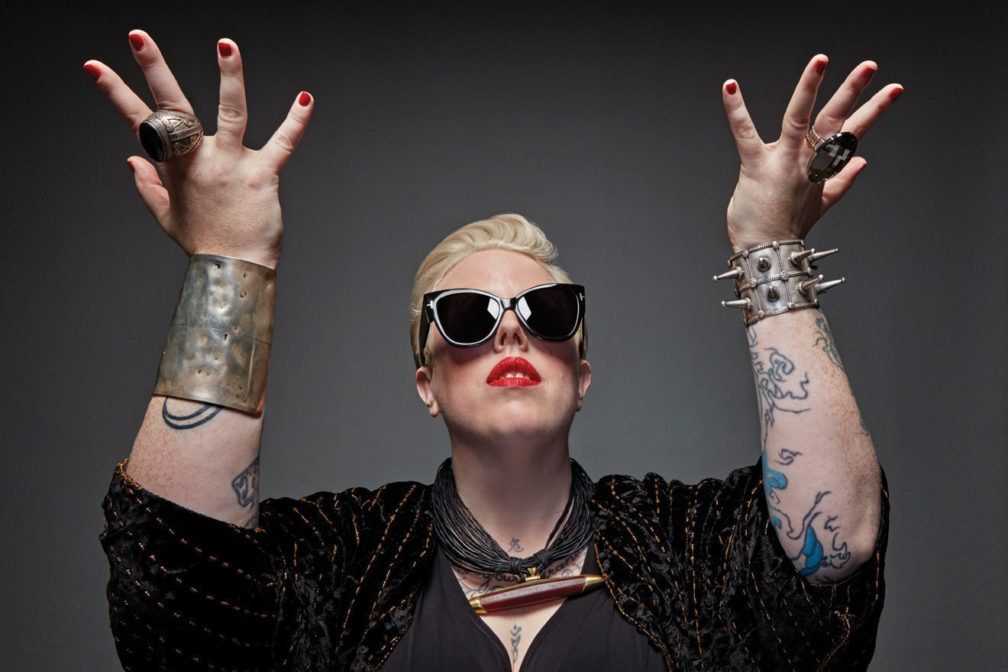 Features
Features
The Black Madonna is The DJ Of The Year
We spent the weekend with the finest selector of 2016
For someone who has fought so hard to be heard, it isn’t surprising that Marea has used her platform to amplify the voices of women, people of colour and the LGBTQ community: voices central to club history, but frequently forced to the periphery, or silenced by the blunt, dumb forces of commercialism.
Much has been made of her influential role at legendary Chicago club Smartbar. She arrived as a resident in 2012 – right when The Black Madonna project was taking off – and went on to become the first talent buyer in the club’s 34-year history. She’s now creative director, and throughout her tenure has worked to assemble a diverse line-up of residents like Honey Soundsystem, Derrick Carter and DVS1 to help continue the legacy of North American house music, from all perspectives. But Marea has proved a keen agent of change beyond Chicago, too – most notably in her frequent criticism of the treatment of women in dance music. And while many have championed her boldness for speaking out, she sees it as basic; necessary. “It has been surprising to me that anyone is surprised,” she says, bluntly. “It goes to show how truly the world is held together by the silence of women. There’s no woman on earth who has not held together a relationship, a job, a community, a family, by their silence – our whole lives, every power structure, every scene, every dance club, everything is held together by the notion that women will not talk about certain things that have happened to them, because if we did, the shit would hit the fan so fucking hard and so fucking fast.”
So she talks. Loudly and often. Even if you’ve never seen her DJ, chances are you’ve seen her name on electronic music Twitter, her unvarnished opinions and correctives appearing like shards of gristle in the over-digested content churn. “I actually don’t think what I say is particularly special; it’s just that I’m saying it, period. But because I’m a lot more interested in solutions than problems, people have been willing to listen. Is there pushback against me being a loud and proud feminist in public? Sure, sometimes. But I am heartened by the number of people that want to change things, even if they aren’t exactly sure how.”
Of course, by attacking some pretty entrenched power structures she has experienced a backlash (she’s become pretty handy at using Twitter’s block button, she concedes). I ask her if she’s ever felt the desire to withdraw from the conversation, if she’s exhausted of being something of a spokesperson for these crucial issues: “I don’t think it’s possible to precisely withdraw from the conversation. I’ll wake up tomorrow and still be a woman working in a male-dominated industry,” she counters. “But, to the degree that the mic comes to me, I am interested in is passing it directly to those people who have important things to say that need to be heard. People need to hear Honey Dijon and they need to hear Discwoman. And they need to hear Peggy Gou. And they need to hear Wendy Carlos.”
Perhaps it isn’t so very surprising that, had she not received that fateful request to work in Chicago, she would have gone into politics. It’s a reveal that will surprise nobody who follows her politically engaged Twitter feed. “What I really wanted to do was join the Democratic Party,” she explains. “I would have liked to have been a speechwriter for a candidate I really cared about.” Later, at dinner, she draws a comparison between her insane touring schedule and the US election. “I don’t just want to win the election,” she declares, eyes sparkling. “I want a mandate!” She laughs her hearty laugh. Sometimes it seems she merely redirected, rather than abandoned, her political ambitions.
But if dance music, and society in general, is far from a utopia, to be at the front of a Black Madonna gig is to be transported somewhere far better. Buried among the sweaty, jubilant mass – there’s lots of girls, but guys too – it’s impossible not to feel The Black Madonna loving each and every one of us right back. Is it too broad a stroke to conflate her own sense of not belonging with her all-encompassing love for those who join her in unburdening themselves? She agrees completely. “For so much of my life I have felt like I was not supposed to be somewhere. Being able to relieve people of that feeling of being on the outside looking in – if I can take that from them and welcome them…”
It seems corny, but in an age of divisive politics, new conservatism and unremitting darkness, we need people like The Black Madonna. To help us, on the dancefloor, transform hurt into resolve, pain into release, tears into sweat... but also show us that the realities that we live in can be so much better, too. “Nobody falls into dance music; everybody’s there for a reason,” she says, her voice cracking with emotion. “However you found your way there, if you’re coming to house music you’re coming to be relieved. I don’t know each person’s story, but I do know what house does. People tend to over-romanticise dance music, but those moments of transformation, those moments are real.” Amen.
‘He Is The Voice I Hear’, the new single on The Black Madonna’s ‘We Still Believe’ imprint will be out early January 2017. A limited edition etched 12” is out now


